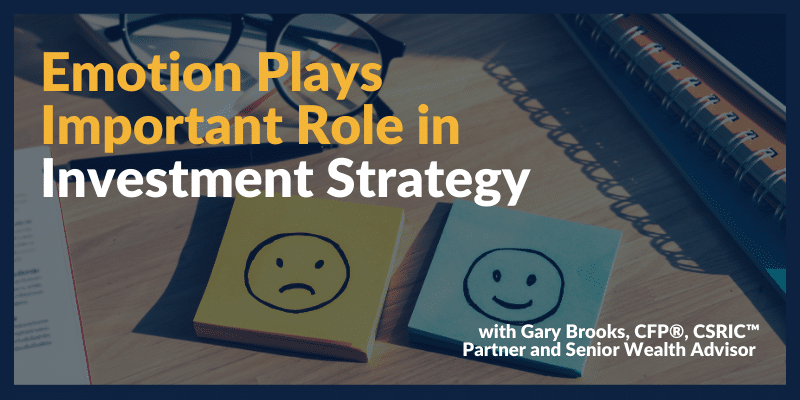
This article was originally published in full on Tacoma’s The News Tribune. Gary Brooks has been a contributing author for the paper since 2008 and he is a Partner and Senior Wealth Advisor at Mission Wealth.
Personal finance is largely viewed as a quantitative exercise, one that seeks to define your financial security (an emotion-generating, life-long experience) in numerical terms. The numerical reference points that capture most people’s attention are investment returns and growth of account balances. That is only part of the story you must consider, however. To be a successful investor, you need a well-calibrated understanding of risk and how you will respond to it at the tops and bottoms of markets.
Navigating Investment Risk: A Holistic Approach Beyond Numbers
Some of the foundational formulas for investment analysis suggest that risk can be defined with a statistical measure called standard deviation. This number defines the range of outcomes around an expected result or long-term average. Since standard deviation includes both negative volatility and positive volatility (when investment value is advancing in your favor), most people aren’t too concerned about standard deviation.
Even if you felt confident that you could statistically define down-market possibilities for your investments, the amount of variance in the value of an investment over any given period probably doesn’t define risk for you. For most people, risk is not when the price of an investment varies. Risk is a more painful outcome. It is a shortfall of income needed to fund current expenses or an investment that has not suffered just a temporary decline in value, but rather an unlikely-to-recover failure.
In this regard, both conservative and aggressive investments can have risks. However, the great majority of conversations about risk tolerance focus on the range of outcomes for stocks.
For instance, many investors would be happy to own the 10.2 percent average annual return generated by a 100 percent global stocks portfolio tracked from 1985-2022 by Dimensional Fund Advisors. However, to achieve that comforting return over the full period, investors would have had to experience large emotional swings tied to investment performance. The best 12-month return was 61.9 percent from March 2009 through February 2010, rising out of the Great Financial Crisis. The worst 12-month period came immediately prior as the global stocks portfolio declined -46.6 percent from March 2008 through February 2009.
Balancing Risk
Fortunately, over the past several decades, broad U.S. stock market indexes have posted annual gains about three times as often as they have declined. But the declines, even relatively brief, such as the sharply negative COVID response in early 2020 or the bear market of the first nine months of 2022, can be so swift that they shock you right off the path to achieving the positive returns that have historically followed.
Bill Bernstein, author of “The Four Pillars of Investing” and other well-reasoned books, discussed this need to be ultra-aware of your sensitivity to down-market risk in a recent “Morningstar Long View” podcast.
“You have to design your portfolio with the worst 2 percent of the time in mind so that you don’t interrupt compounding,” Bernstein said. “You probably should have more safe assets than you think you should have. A suboptimal portfolio that you can execute is better than the optimal one that you cannot execute. The older I get, the less I depend on the mathematics of investing and the more attention I pay to the psychological and emotional aspects of investing. There are a lot of people out there who can talk the talk inside of a spreadsheet but when it comes time to walk the walk, when it looks like the world economy is going to shut down, or the banks are going to go kerplunk. You have to design your portfolio with those times in mind.”
Building some defense into your portfolio can help reduce deep declines in account balances. The same defense may, more importantly, limit your emotional response to circumstances that can upend your best intentions while the crisis du jour causes tension.
As an example of defense, a 60 percent stocks, 40 percent bonds portfolio had a lower average annual return than the 100 percent stocks example above (8.7 percent from 1985-2022, instead of 10.2 percent). But that lighter-stock portfolio also came with only two-thirds of the all-stock portfolio standard deviation. If that more stable return pattern is what keeps you invested through all conditions and saves you from exiting your strategy, hoping to make a well-timed return another day, then the lower return actually earned is likely to generate more financial security over time than the go-for-it portfolio that was attractive but elusive.
Mission Wealth’s Investment Strategy
Numbers undoubtedly hold significance in the realm of personal finance, but they should not overshadow the significance of risk management. To become a successful investor, you must acknowledge the emotional and psychological dimensions of risk alongside the statistical data. Building a resilient portfolio that can withstand market volatility while addressing your individual risk tolerance is key.
As the financial landscape evolves, remember that true financial security emerges from a well-balanced, holistic approach that considers both numbers and emotions. Reach out to our behavioral finance experts at Mission Wealth today.
Financial Guidance For Your Life Journey
Talk with a financial planner about your next steps.Guidance For Your Full Financial Journey
Through our comprehensive platform and expertise, Mission Wealth can guide you through all of life's events, including retirement, investment planning, family planning, and more. You will face many financial decisions. Let us guide you through your options and create a plan.
Mission Wealth’s vision is to provide caring advice that empowers families to achieve their life dreams. Our founders were pioneers in the industry when they embraced the client-first principles of objective advice, comprehensive financial planning, coordination with other professional advisors, and proactive service. We are fiduciaries, and our holistic planning process provides clarity and confidence. For more information on Mission Wealth, please visit missionwealth.com.
To meet with a Mission Wealth financial advisor, contact us today at (805) 882-2360.
Recent Insights Articles

IRS Issues Final SECURE Act Regulations: Affects RMDs, Inherited IRAs, and More
July 24, 2024
Mission Wealth Named to FA Magazine’s 2024 RIA Ranking and FA’s Top 50 Fastest Growing RIAs
July 22, 2024

